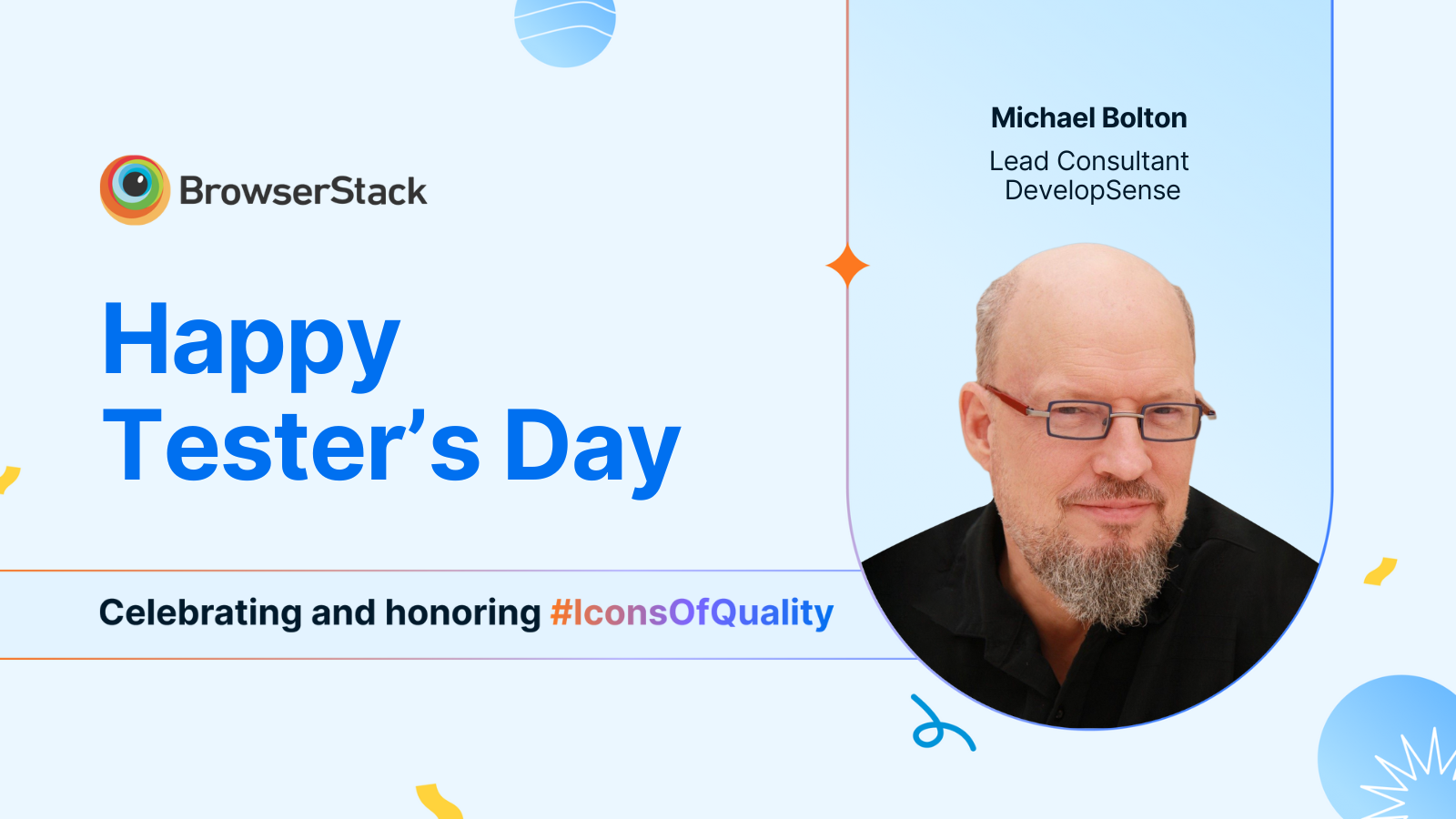
To celebrate the relentless passion of testers, BrowserStack is honoring some of the icons in the testing space - those who push the industry forward by sharing their knowledge with the community at large through their thought leadership.
Meet Michael Bolton, a seasoned testing expert and co-author of Rapid Software Testing, who’s been helping teams tackle tricky testing problems for over 35 years. With a knack for cutting through the noise and a passion for quality, Michael’s mission is to uncover the hidden truths about software - before they become costly surprises.
Tell us a bit about your role as the Lead Consultant at DevelopSense.
I’m a consultant on software development, quality awareness, and testing. My principal focus is on helping people to solve testing problems that they didn’t realize they could solve. Alongside my colleague James Bach, I co-authored Rapid Software Testing (RST), an approach that prepares testers to handle software under uncertain and high-pressure conditions. My motivation is to help people discover any differences between the product they think they have and the product they’ve got, so that no one is blindsided by unpleasant surprises and risks that threaten the business.
With over 35 years of experience in testing, development, and management, I’ve spent the last 25 years as an independent consultant, working with organizations across various domains to improve their testing practices.
My current focus is on what I call "The Secret Life of Automation," as I see many unhelpful and risky practices being pushed by tool vendors and some Agile enthusiasts, especially concerning AI and LLMs. Critical thinking around these technologies needs to make a comeback, and I’m keen to be part of that conversation.
And James and I are working on a book, Taking Testing Seriously, to help testers, developers, and managers to do exactly what the title says.
Explore how BrowserStack Automate can simplify your test automation process.
What’s one piece of advice you would give to someone just starting their career in software testing?
Prepare, develop your skills, and strap in.aa There are really strong headwinds for testers these days, because the testing business has been undermined by commoditization and and certifications that often miss the point.
The point is finding problems that matter before it’s too late. This is a socially challenging job because, for the most part, people don’t want to hear about problems. However, if there are problems, it tends to be better for the business to know about them so that they can be addressed.
How do you keep up with all the new trends and tools in software testing?
Honestly, I don’t stress too much about every new trend. Many of them are old wine — and some of it has turned to vinegar — in fancy new bottles. If a tool is genuinely useful, it evolves and endures. Pop music is like that, too.
What’s a testing trend that’s got you excited these days?
I’m particularly interested in what we call augmented experiential testing. This type of testing mirrors the real-world experience of users, including operations and support personnel.
My colleague James Bach is developing tools that monitor, log, and analyze these interactions, helping us understand how software works under real-world conditions—and, crucially, how it doesn’t.
Create perfect bug reports in one click with BrowserStack Bug Capture.
Has AI changed the way you and your team approach testing and if yes how?
Not very much. Think of AI like this: on the one hand, it’s software like any other kind of software. On the other hand, it’s mostly software based on algorithms whose operations and behaviour are obscure, and for which we don’t have source code. If it doesn’t do what we want it to do, it’s not at all clear what specifically is wrong, and it’s not at all clear how to fix it.
My experience with using AI-based tools is that they’re fundamentally unreliable, and as a tester, I need to be able to trust my tools. My experience with testing AI-based products, so far, is also that they’re fundamentally unreliable — and if my clients need reliable systems, they’ll need lots of supervision and scrutiny over the output.
What are your go-to productivity hacks that help you stay on top of your game?
A few years ago, I wrote some code to manage a library of keyboard shortcuts and macros. The underlying technology is old and simple, but it allows me to save literally thousands of keystrokes a day. When I find myself typing the same thing over and over again, I capture what I’m typing and put it into a macro.
But here’s another productivity hack: beware of productivity hacks. Sometimes they’re way more trouble than they’re worth; they give the illusion of productivity - but only when you’re oblivious to how much time and energy they’re costing without you noticing. A bike often gets you somewhere faster and more easily than a car does — and there are equivalents of that all over the place. Beware of optimizing a task that’s not worth doing at all.
(Responses have been edited for clarity.)
Stay tuned as we continue to spotlight more #IconsOfQuality, honoring those who make a difference in the field of software testing. If you know someone who’s impacted your software testing journey, nominate them and share your stories using #IconsOfQuality.
